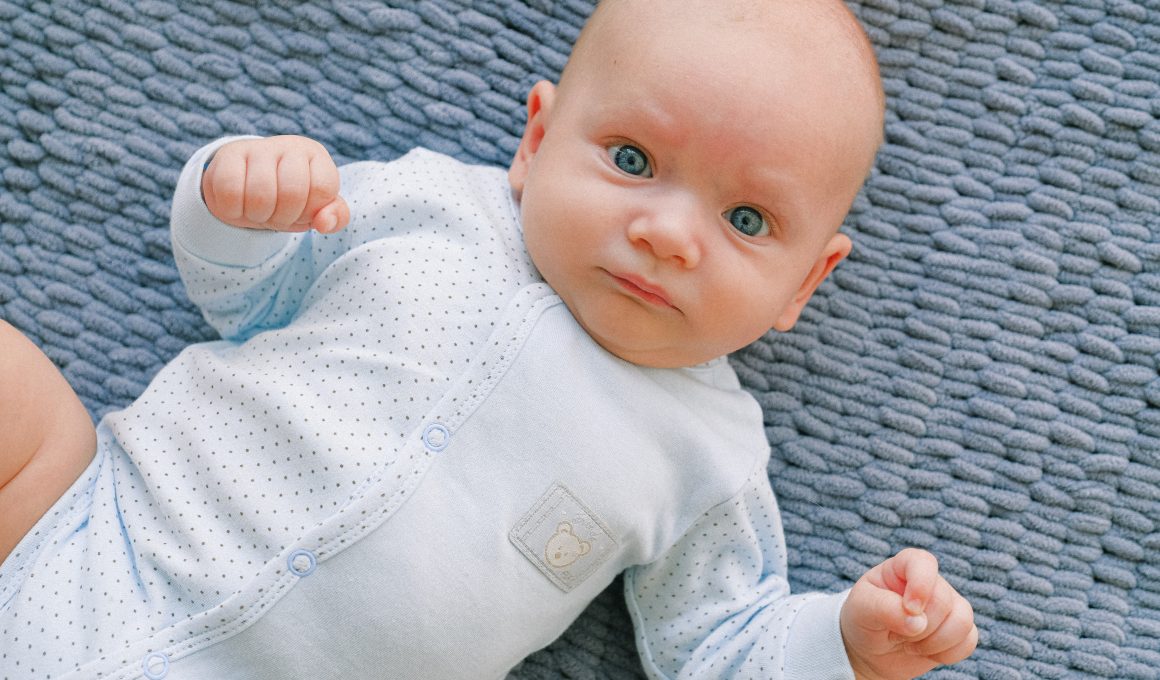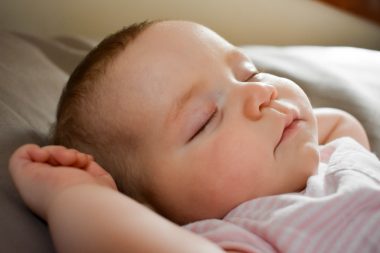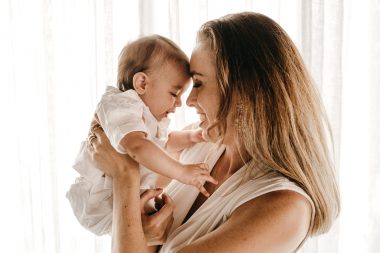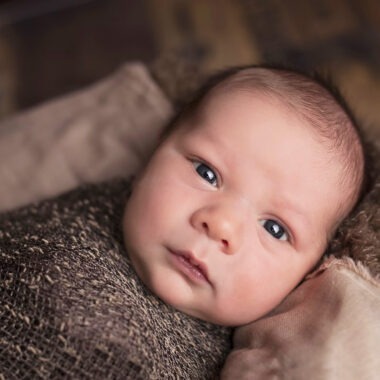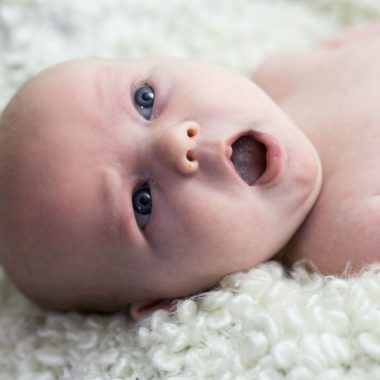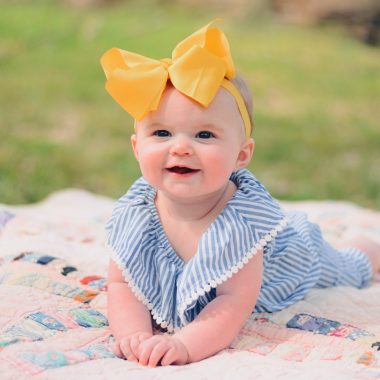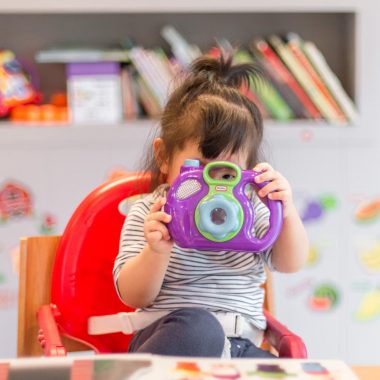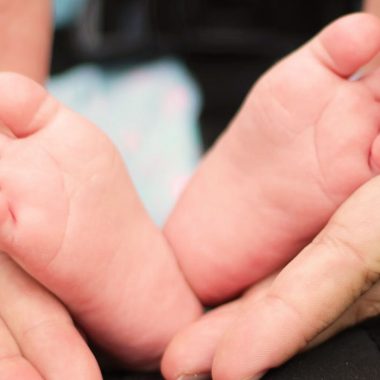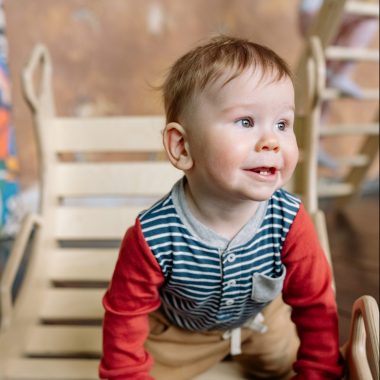Embarking on the incredible journey of language acquisition is a pivotal milestone in your baby’s growth. But, the key to unlocking this extraordinary world of language lies in their ability to hear. This is why having your baby’s hearing tested at key milestones is critical, starting at birth.
Your baby begins to hear sounds before birth. After they’re born, they start observing your face and listening to your words. Their hearing system continues to develop each day.
At 3 months, your baby will smile when spoken to, and at 6 months they will begin to babble and imitate certain sounds. If your baby cannot hear, this process of development slows down significantly.
In this article we will look into hearing loss in babies. We will first define hearing loss in babies and then study the most frequently asked questions alongside their answers.
Most newborns hear well, but every year an estimated 6,000 are born in the U.S. with hearing that falls outside the typical range. Early screening is a crucial step in identifying children who need early intervention and support to gain language skills that will help them learn.
Without screening or testing, hearing loss may not be noticed until the baby is more than a year old. The American Academy of Pediatrics (AAP) supports newborn hearing screenings required in all 50 states.
And because a child’s hearing can change over time, yearly hearing screenings for children aged 4 through 6, followed by additional screening at ages 8 and 10 are also recommended.
In most states, newborns get hearing screening tests before going home. If it’s not done then, or a baby was born at home or at a birthing center, it’s important to check their hearing within the first 3 weeks of life.
A baby who doesn’t pass a hearing screening doesn’t necessarily have hearing loss. Another hearing test should be done by 3 months of age. If it confirms the presence of a hearing problem, doctors recommend starting treatment before 6 months.
Even newborns who pass their initial hearing screening should be observed for signs that they might not be hearing well.
Hearing loss can affect a baby’s ability to develop speech, language, and social skills. The earlier a child gets a treatment, the more likely they are to reach their full potential. Read on to learn more about hearing loss and intervention techniques.
Table of Contents
What is hearing loss in babies?
Hearing loss is when any part of the ear isn’t working in the usual, expected way. Contrary to popular belief, hearing loss does not only affect the elderly. It can also affect babies.
When we talk about hearing loss in babies, it can mean that the baby has lost some or all of their hearing in one or both ears.
This impairment can be,
- partial (this means the baby can’t hear certain sounds).
- complete (this means that the baby can’t hear any sound).
- temporary.
- permanent.
When a baby is born with hearing loss, it’s called congenital hearing loss.
Hearing loss can also develop later in babies or during childhood or adulthood. This is called acquired hearing loss.
Hearing loss is categorized as mild, moderate, severe or profound depending on its severity.
ALSO READ: Terrible Twos: What Is It And How You Can Deal With It?
What is congenital hearing loss?
Congenital hearing loss is hearing loss present at birth. It may also be called congenital deafness if the hearing loss is very severe or profound. Congenital hearing loss can have many causes, but in most cases it is hereditary.
Other causes of congenital hearing loss include:
- Maternal infections, such as rubella
- Premature birth
- Low birth weight
- Birth injuries
- Drug and alcohol use during pregnancy
- Maternal diabetes
Babies born with congenital CMV (Cytomegalovirus) may have hearing loss at birth or it may develop later.
What is acquired hearing loss?
Acquired hearing loss is hearing loss which appears after birth, at any time in one’s life, perhaps as a result of a disease, condition or injury.
Below are some examples of conditions that can cause acquired hearing loss:
- Ear infections (like otitis media, an inflammation in the middle ear)
- Ototoxic drugs (auditory damage is a side effect)
- Meningitis
- Measles
- Encephalitis
- Chicken pox
- Influenza
- Mumps
- Head injury
- Noise exposure
ALSO READ: Baby Hearing Development: All You Need to Know
What are some signs of hearing loss in babies?
Below are some signs and symptoms that indicate hearing loss in babies:
- Not being startled by loud sounds.
- Not turning towards a sound after they are 6 months old.
- Not saying single words like “mama” or “dada” by the time they are 1 year old.
- Turn their head if they see you, but not if you only call out their name.
- Hearing some sounds but not others.
If your baby shows any sign of hearing loss at any time, call your health care provider to get your baby’s hearing checked. Always keep in mind that early intervention to some health problems can mean a lot.
What are some hearing developmental milestones?
Even after your baby passes their newborn hearing screening test, you should continue to monitor their milestones as they grow and develop.
Below are some guidelines to check if your baby’s hearing is on track according to American Speech-Language-Hearing Association (ASHA).
And as always you should keep in mind that all babies are different and reach milestones at slightly different ages.
|
Hearing and comprehension |
Talking |
|
Birth–3 months · Startles at loud sounds. · Quiets or smiles when you talk. · Seems to recognize your voice. Quiets if crying. |
Birth–3 months · Makes cooing sounds. · Cries change for different needs. · Smiles at people. |
|
4–6 months · Moves their eyes in the direction of sounds. · Responds to changes in your tone of voice. · Notices toys that make sounds. · Pays attention to music. |
4–6 months · Coos and babbles when playing alone or with you. · Makes speech-like babbling sounds, like pa, ba, and mi. · Giggles and laughs. · Makes sounds when happy or upset. |
|
7 months–1 year · Turns and looks in the direction of sounds. · Looks when you point. · Turns when you call their name. · Understands words for common items and people—words like cup, truck, juice, and daddy. · Starts to respond to simple words and phrases, like “No,” “Come here,” and “Want more?” · Plays games with you, like peek-a-boo and pat-a-cake. · Listens to songs and stories for a short time. |
7 months–1 year · Babbles long strings of sounds, like mimi upup babababa. · Uses sounds and gestures to get and keep attention. · Points to objects and shows them to others. · Uses gestures like waving bye, reaching for “up,” and shaking his head no. · Imitates different speech sounds. · Says 1 or 2 words, like hi, dog, dada, mama, or uh-oh. This will happen around their first birthday, but sounds may not be clear. |
Does my baby have hearing loss?
The Centers for Disease Control and Prevention (CDC) and the American Academy of Pediatrics (AAP) recommend that all babies get screened for hearing loss before they’re 1 month old.
Most babies get their hearing checked as part of newborn screening before they leave the hospital after birth.
Hearing screening can tell if a baby might have hearing loss. It is an easy process and it is not painful. It takes a very short time and usually only lasts a few minutes.
If your baby doesn’t pass their newborn hearing screening, it doesn’t always mean they have hearing loss. However, your baby needs a full hearing test before 3 months of age. A full hearing test can help your baby’s health care provider diagnose hearing loss.
If your baby has hearing loss, it is important to seek treatment right away.
ALSO READ: Tummy Time 101 – Why Your Baby Needs It
What are the causes and risk factors of hearing loss?
Hearing loss can happen any time during life, from birth to adulthood. However, some factors can increase the chances of your child getting hearing loss. These include:
Genetic causes
About 1 out of 2 cases of hearing loss in babies is due to genetic causes. This means that one of two babies suffering from hearing loss acquire it through genetics and share the condition with other family members.
About 1 out of 3 babies with genetic hearing loss have a “syndrome.” This means they have other conditions in addition to hearing loss, such as Down syndrome or Usher syndrome.
Other causes
1 out of 4 cases of hearing loss in babies is due to maternal infections during pregnancy, complications after birth, and head trauma. For example, the baby might have hearing loss if they,
- Were exposed to infection before birth.
- Spent a few days in a hospital neonatal intensive care unit (NICU) or had complications while in the NICU.
- Had head, face or ears shaped or formed in a different way than usual.
- Have a condition like a neurological disorder that may be associated with hearing loss.
- Had an infection around the brain and spinal cord called meningitis.
- Received a bad injury to the head that required a hospital stay.
What are the types of hearing impairment?
Your ear is made up of three parts: the outer, middle and inner ear. And there are two main types of hearing loss; conductive and sensorineural. Hearing impairments happen in different parts of the ear.
Conductive hearing loss
Conductive hearing loss means that there is a problem with the outer or middle parts of the ear. This prevents sound waves from reaching the inner ear properly.
Temporary conductive hearing loss can be due to:
- A large amount of wax lodged in the ear canal.
- Middle ear infection.
- Fluid in the middle ear.
Conductive hearing loss may be permanant if your child’s ear bones or ear canal are:
- Damaged.
- Incorrectly formed.
Sensorineural hearing loss (also called nerve deafness)
This type of hearing impairment is caused by an abnormality of the inner ear or the nerves that carry sound messages from the inner ear to the brain.
The impairment can be present at birth or occur anytime after. It can be caused by:
- A problem with the development of the inner ear.
- A physical injury to the head or inner ear.
- Damage to the ear from diseases such as menengitis.
- Excessive exposure to loud noise.
Problems with the inner ear can be caused by:
- Genetic problems.
- An infection during pregnancy.
- Problems due to a preterm birth.
Sensorineural hearing losses is usually permanent.
ALSO READ: Thumb-Sucking: What You Need to Know
Can babies grow out of hearing loss?
This is a question you should ask your baby’s doctor. Experts share that it is often possible to treat hearing loss that is caused by problems in the middle ear with medicines or surgery.
But also, generally speaking, there is no cure for hearing loss caused by damage to the inner ear or nerves. So how well your baby does depends on the cause, nature, and severity of their hearing loss.
Advances in hearing aids and other devices, as well as speech therapy, allow many children to develop normal language skills at the same age as their peers with normal hearing.
Even infants with profound hearing loss can do well with the right combination of treatments.
Can babies with hearing loss or deafness babble?
Babbling is a normal stage of language development among babies. Babies with hearing loss tend to babble less, which can be an early warning sign they aren’t hearing well.
Researchers at the University of Missouri (MU) published a study showing that babies with profound hearing loss rarely make repetitive vowel sounds like “da-da”, “ma-ma” and “ga-ga” which is common among babies without hearing loss.
But MU researchers also found that thanks to cochlear implants infants began babbling with the same frequency as typically hearing infants within just a few months.
Cochlear implants are small electronic devices embedded behind the ear that serve to replace some functions of the impaired inner ear.
Researchers noted that not only was there an increase in vocalizations with repetitive syllables, but that the number of repetitions in the string also increased.
How do you treat hearing loss in babies?
Timing is an important factor in treating hearing loss in babies. This means that the earlier that hearing loss in a baby is identified and treated, the better their overall development is.
Of course, treatment depends on the cause and severity of the baby’s hearing loss. When a baby has an ear infection, they may be given medicines such as antibiotics.
Other possible treatments due to the cause and severity of the hearing loss might include:
- removal of wax
- hearing aids or other technology to assist hearing
- a cochlear implant for severe hearing loss
- speech and language therapy
- assistance from a specialist teacher
Children with hearing impairment should undergo routine developmental assessments.
ALSO READ: Key Signs of Speech and Language Delays in Your Child
What can I do to help my baby improve their hearing?
Experts recommend the following to help your baby with hearing development.
- Check if your child can hear. See if they turn to noises or look at you when you talk. Pay attention to ear problems and infections, and consult with your doctor.
- Respond to your baby, pay attention. Look at them when they makes noises. Talk to them, imitate the sounds they make.
- Laugh when your baby does. Imitate the faces they make.
- Teach your baby to imitate actions, like peek-a-boo, clapping, blowing kisses, and waving bye-bye. This teaches them how to take turns. We take turns when we talk.
- Talk about what you do during the day. Say things like “Mommy is washing your hair”; “You are eating peas”…
- Talk about where you go, what you do there, and who and what you see. Say things like, “We are going to Grandma’s house. Grandma has a cat.”
- Teach animal sounds, like “A cow says ‘moo.’”
- Read to your baby every day.
- Talk to your baby in the language you are most comfortable using.
Why early diagnosis is key for hearing loss?
Hearing loss must be diagnosed as soon as possible. Hearing sounds and words helps children learn to talk and understand.
A child with hearing loss misses out on these sounds. This can cause problems with speaking, reading, school success, and social skills. It is important to have your child tested if you think they have trouble with hearing. Early diagnosis is key.
Hearing loss in children can lead to:
- Delayed speech and language skills
- Learning problems in school
- Low self-esteem
- Having trouble making friends
The most important thing you can do is to have your child’s hearing tested.
With early help, your child might speak or use sign language just as well as children who hear.
You can check with family doctors, pediatricians, and well-baby clinics for hearing loss. If an impairment is detected, your child may be referred to an audiologist (hearing specialist).
An audiologist can test your child’s hearing. They will also be able to guide you on the best way to treat your child’s hearing loss. This may include medical treatment, hearing aids, or speech and language therapy.
References: marchofdimes.org, healthychildren.org, pregnancybirthbaby.org.au, asha.org, hopkinsmedicine.org, manchester.ac.uk, cdc.gov, webmd.com, sciencedaily.com


